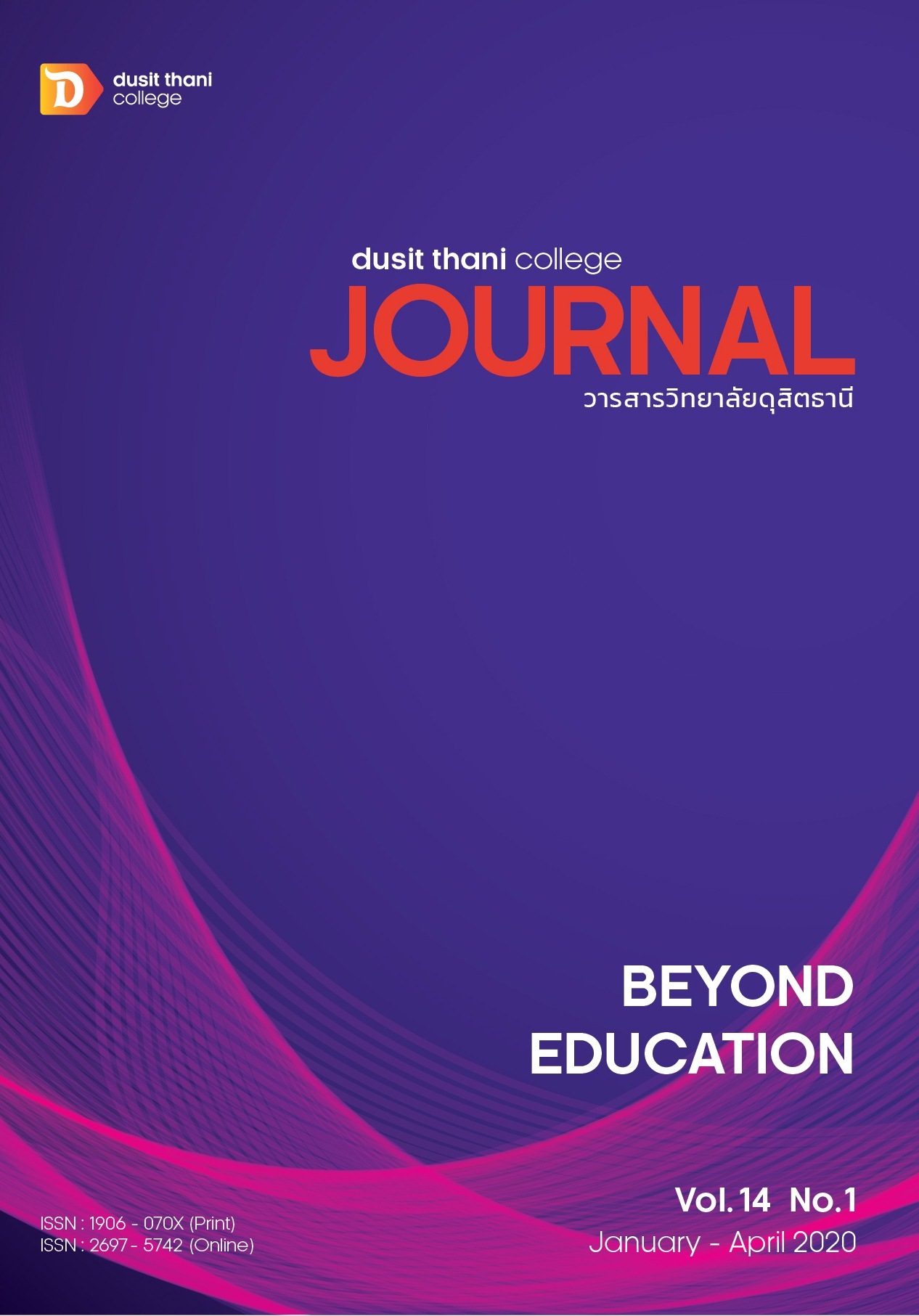รูปแบบการพัฒนาสมรรถนะระหว่างวัฒนธรรมของอาจารย์หลักสูตรนานาชาติ
Main Article Content
บทคัดย่อ
การวิจัยครั้งนี้ มีวัตถุประสงค์เพื่อนำเสนอรูปแบบการพัฒนาสมรรถนะระหว่างวัฒนธรรมของอาจารย์หลักสูตรนานาชาติ วิธีดำเนินการวิจัยมี 3 ขั้นตอน คือ 1) ศึกษาสภาพปัจจุบันของสมรรถนะระหว่างวัฒนธรรมของอาจารย์หลักสูตรนานาชาติ กลุ่มตัวอย่างที่ใช้ในการวิจัย คือ อาจารย์หลักสูตรนานาชาติในมหาวิทยาลัยของรัฐและมหาวิทยาลัยในกำกับ ได้มาด้วยวิธีการสุ่มตัวอย่างหลายขั้นตอนจำนวน 300 คน เครื่องมือที่ใช้ คือ แบบวัดสมรรถนะระหว่างวัฒนธรรมของอาจารย์หลักสูตรนานาชาติ วิเคราะห์ข้อมูลโดยการวิเคราะห์สถิติเชิงบรรยายโดยใช้โปรแกรมคอมพิวเตอร์สำเร็จรูป 2) การสร้างรูปแบบการพัฒนาสมรรถนะระหว่างวัฒนธรรมของอาจารย์หลักสูตรนานาชาติด้วยการสังเคราะห์เอกสารและงานวิจัยที่เกี่ยวข้องและสัมภาษณ์อาจารย์หลักสูตรนานาชาติจำนวน 20 คน เครื่องมือที่ใช้ในการวิจัย ได้แก่ แบบสัมภาษณ์กึ่งโครงสร้าง “แนวคิดการพัฒนาสมรรถนะระหว่างวัฒนธรรมของอาจารย์หลักสูตรนานาชาติ” 3) ประเมินความเหมาะสมและการนำรูปแบบไปใช้พัฒนาสมรรถนะระหว่างวัฒนธรรมของอาจารย์หลักสูตรนานาชาติด้วยผู้ทรงคุณวุฒิทางการศึกษาจำนวน 5 คน เครื่องมือที่ใช้ในการวิจัย ได้แก่ แบบประเมินความเหมาะสมและความเป็นไปได้ของการนำรูปแบบการพัฒนาไปใช้
ผลการวิจัยพบว่า
1) ผลการศึกษาสมรรถนะระหว่างวัฒนธรรมของอาจารย์หลักสูตรนานาชาติ พบว่า อาจารย์หลักสูตรนานาชาติในมหาวิทยาลัยรัฐบาลและมหาวิทยาลัยในกำกับจากกลุ่มตัวอย่าง 300 คน มีสมรรถนะระหว่างวัฒนธรรมระดับมาก เรียงลำดับจากมากไปน้อย คือ อาจารย์หลักสูตรนานาชาติกลุ่มตัวอย่างส่วนใหญ่มีมิติด้านทัศนคติต่อความหลากหลายทางวัฒนธรรมระดับมาก คิดเป็น ร้อยละ 72.67 มิติด้านความรู้ในการสื่อสารและความหลากหลายทางวัฒนธรรมระดับมาก คิดเป็น ร้อยละ 67.67 และ มิติด้านการปฏิสัมพันธ์และการสอนระหว่างวัฒนธรรมระดับมาก คิดเป็นร้อยละ 63
2) ผลการสร้างรูปแบบการพัฒนาสมรรถนะระหว่างวัฒนธรรมของอาจารย์หลักสูตรนานาชาติ พบว่า รูปแบบการพัฒนาสมรรถนะระหว่างวัฒนธรรมของอาจารย์หลักสูตรนานาชาติแบ่งเป็น 2 ระยะ 5 วิธีการ ดังนี้ ระยะที่ 1 การพัฒนาก่อนเข้าปฏิบัติงานจริง ประกอบด้วย 2 วิธีการ คือ การอบรมสัมมนา และการสร้างคำปรึกษาแบบรายบุคคล การจัดตั้งศูนย์ให้คำปรึกษาประสบการณ์ห้องเรียนนานาชาติ ระยะที่ 2 การพัฒนาระหว่างการปฏิบัติงานจริง ประกอบด้วย 3 วิธี คือ การให้สมรรถนะระหว่างวัฒนธรรม และการประชุมกลุ่มย่อย
3) ผลการประเมินรูปแบบการพัฒนาสมรรถนะระหว่างวัฒนธรรมของอาจารย์หลักสูตรนานาชาติ พบว่า ผลการประเมินด้านการนำไปใช้ประโยชน์และการบรรลุวัตถุประสงค์ของการใช้รูปแบบการพัฒนาสมรรถนะระหว่างวัฒนธรรมของอาจารย์หลักสูตรนานาชาติมีความเหมาะสมและมีความเป็นไปได้ในการนำไปใช้อยู่ในระดับมาก
Article Details
นโยบายการพิจารณากลั่นกรองบทความ
- บทความวิจัยและบทความวิชาการทุกเรื่องที่จะได้รับการตีพิมพ์ต้องผ่านการพิจารณากลั่นกรองโดยผู้ทรงคุณวุฒิ (Peer Review) ในสาขาที่เกี่ยวข้อง จำนวน 3 ท่าน/บทความ
- บทความ ข้อความ ภาพประกอบและตารางประกอบที่ลงตีพิมพ์ในวารสารเป็นความคิดเห็นส่วนตัวของผู้เขียน กองบรรณาธิการไม่จำเป็นต้องเห็นด้วยเสมอไป และไม่มีส่วนรับผิดชอบใด ๆ ถือเป็นความรับผิดชอบของผู้เขียนแต่เพียงผู้เดียว
- บทความที่จะได้รับการตีพิมพ์จะต้องไม่เคยตีพิมพ์ เผยแพร่ที่ใดมาก่อน และไม่อยู่ระหว่างการพิจารณาของวารสารฉบับอื่น หากตรวจสอบพบว่ามีการตีพิมพ์ซ้ำซ้อน ถือเป็นความรับผิดชอบของผู้เขียนแต่เพียงผู้เดียว
- บทความใดที่ผู้อ่านเห็นว่าได้มีการลอกเลียนหรือแอบอ้างโดยปราศจากการอ้างอิง หรือทำให้เข้าใจผิดว่าเป็นผลงานของผู้เขียน กรุณาแจ้งให้กองบรรณาธิการวารสารทราบจะเป็นพระคุณยิ่ง
เอกสารอ้างอิง
2. Botha, A., Vosloo, S., Kuner, J., & Berg, M., (2009) Improving Cross-Cultural Awareness and Communication through Mobile Technologies. International Journal of Mobile and Blended Learning, 1(2), April-June 2009, pp.39 - 53.
3. Byram, M.C. (1997) Teaching and Assessing Intercultural Communicative Competence. UK : Clevedon, Multilingual Matters.
4. Chantarasenanon C. (2010) DEVELOPMENT OF A CULTURAL COMPETENCE SCALE FOR
SECONDARY SCHOOL STUDENTS. Degree of Doctor Philosophy Program in Educational
Measurement and Evaluation, Department of Educational Research and Psychology,
Faculty of Education Chulalongkorn University.
5. Chunpen N. (2012) Development Of Indicators And A Scale For Measuring Teachers’cross-Cultural Competence : Testing Measurement Invariance By Teachers’background. Degree of Master of Education Program in Educational Research Methodology, Department of Educational Research and Psychology, Faculty of Education Chulalongkorn University.
6. Chonh Pui Yee.(2013). Internationalization of Higher Education : A Literature Review on
competency approach. College of Foundation & General Studies, Universiti
Tenaga Nasional, Jalan IKRAM-UNITEN, Kajang, Malaysia.
7. Deardorff, D. K. (2006) “The Identificaton and Assessment of Intercultural Competence as a Student Outcome of Internationalization at Institutions of Higher Education in the United States.” Journal of Studies in International Education. Fall 2006. 10 p. 241-266 and The SAGE Handbook o Intercultural Competence. 2009 .
8. Fantini, A. E.,(ed.) (2001) “Designing Quality Intercultural Programs : A Model and a Process,” in interspectives : A Journal on Transcultural Education, 18 : 100 - 5.
9. Fantini, A, & Tirmizi, A (2006) Exploring and Assessing Intercultural Competence.
SIT Graduate Institute/SIT Study Abroad DigitalCollections@SIT.
10. Gopal, A. (2011) “Internationalization of Higher Education : Preparing Faculty to Teach
Cross- culturally” .International Journal of Teaching and Learning in Higher
Education. Vol.13 Queens University.
11. Healey, M. & Jenkins, A.(2000) Kolb’s Experiential Learning Theory and Its Application in geography in higher education , Journal of Geography,99,pp.185 - 195.
12. Heinzmann, S., Künzle, K., Schallhart, N., & Müller, M. ( 2015) The effect of study aboard onintercultural competence :Results from a longitudinal quasi-experimental study. The Interdisciplinary Journal of Study Aboard Vol.26 pp. 187 - 207
13. Kolb D.A. (1984) Experimential Learning : Experience as the Source of Learning and
Development. Prentice-Hall, New Jersey,
14. Kolb, D. A., & Fry, R. (1975). Toward an applied theory of experiential learning. In C.
Cooper (Ed.), Studies of group process (pp. 33 - 57). New York: Wiley.
15. Kovalainen, N., Keisala, K. (2012) The Role of Shared Foreign Language in Intercultural
Communication: A Case of Working Environments. International Journal of Humanities and Social Science Vol. 2 No. 20 Special Issue - October 2012, pp.52-72.
16. Heinzmann, S., Künzle, K., Schallhart, N., & Müller, M..( 2015) The effect of study aboard on intercultural competence : Results from a longitudinal quasi-experimental study, The Interdisciplinary Journal of Study Aboard. Vol.26.
17. Marchis, L., Ciascai, L.,& Saial, J. (2008). Developing Intercultural Competencies Using Activities withdifferent Media. ACTA DIDACTICA NAPOCENSIA Volume 1, pp. 39 - 47.
18. Polyak, L., Kery, D. and Tardos, K. (2012). Measuring and Developing Intercultural Competence of University Faculty
19. King, P. M., Perez, R. J., & Shim, W. J. (2013). How college students experience intercultural learning: Key features and approaches. Journal of Diversity in Higher Education, 6(2), 69 - 83.
20. Salisbury, M. H. (2011) The effect of study abroad on intercultural competence among undergraduate college students, Doctor of Philosophy thesis, University of Iowa, 2011.
21. Qi Cui (2016) A Study of Factors Influencing Students’ Intercultural Competence. Journal of Language Teaching and Research. 7(3), pp. 433 - 439..
22. Stone, N. (2006) Conceptualizing International Effectiveness for University Teaching. Journal of Studies in International Education.
23. Thepphornbanchakit J. (2013) Effectiveness of Management Model in Teaching and Learning International Curriculum of Thai Private University. Degree of Doctor Philosophy Program in Research and Development Education, Faculty of Education Chiang Mai University.
24. Tudorache, L. (2012) Set of Methods and tools for development of intercultural competence PROJECT.


